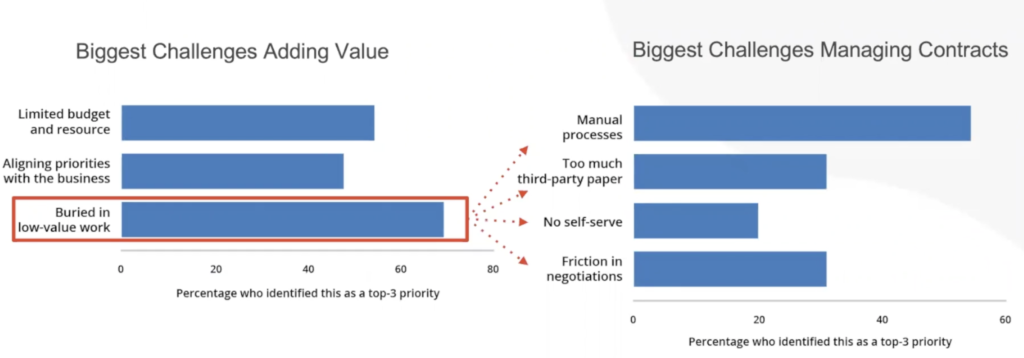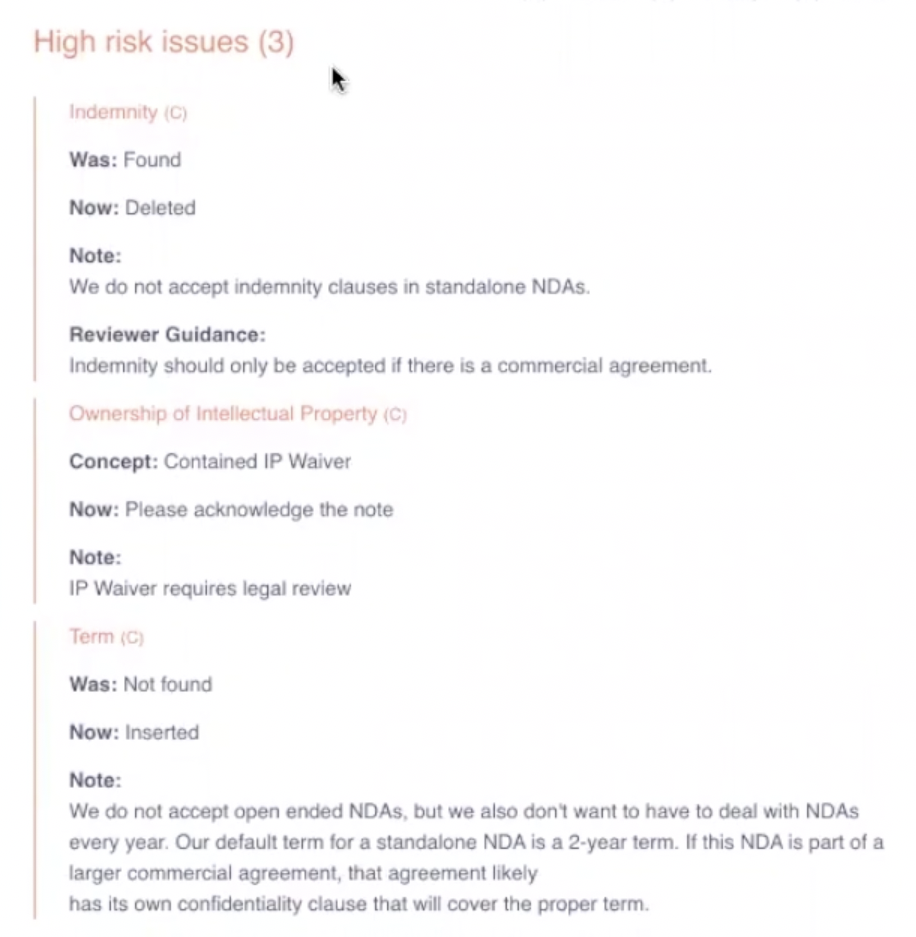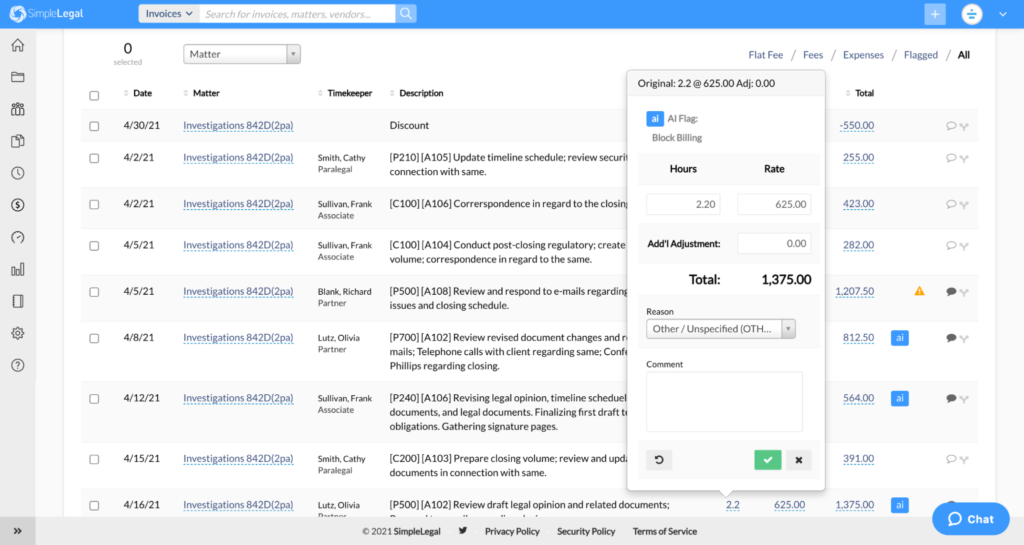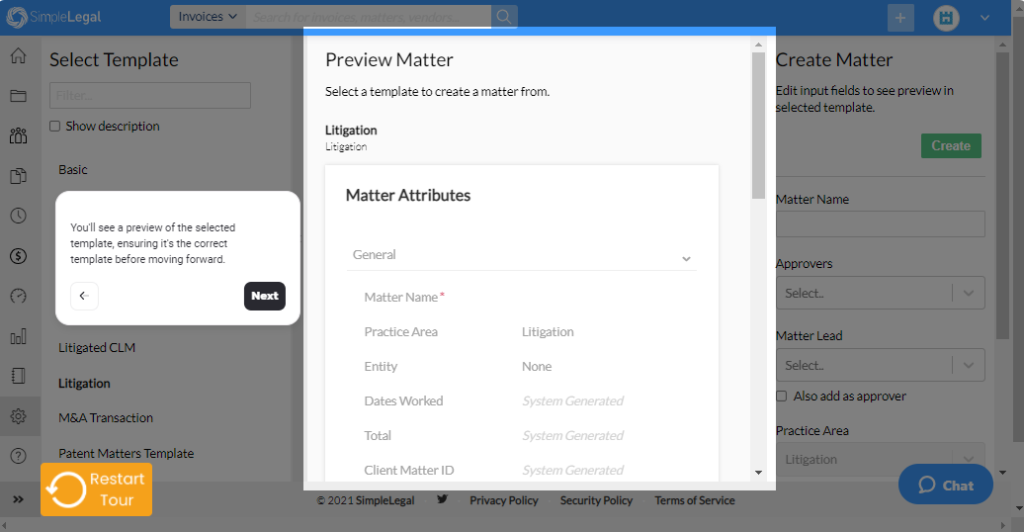4 ways AI in law improves legal ops’ efficiency

Businesses expect in-house legal departments to do more legal work with fewer resources today. Blickstein Group’s 13th Annual Law Department Operations Survey found that department resources (funding for personnel, technology, and personal retention) were one of the top three biggest challenges of 2020. That’s why legal departments should consider using artificial intelligence (AI) in law, especially in legal operations— it boosts productivity by reducing the time spent on tedious manual work, freeing you up to concentrate on high-priority tasks.
But what is AI in law? AI in law describes the application of computer-simulated human thought processes and behaviors to legal work. The aim is to use fewer resources to perform work without sacrificing quality. It’s important to note, however, that while legal AI— and even other mainstream AI like autocorrect or voice-powered personal assistants — can improve processes based on predefined rules, we are still not at a place where AI can replace humans. This is especially true in a field like law, where legal professionals are constantly crafting complex arguments and handling strategic planning.
AI learns by observing how you’ve handled different tasks to then predict and execute actions you would normally take. And when AI is confronted with new scenarios or areas out of its scope — like a billing guideline violation review, for example — it flags them so you can perform a deeper review, just like a human assistant. With AI, you can cut costs and improve your legal ops’ performance and efficiency. Here are four ways AI in law affects performance in legal operations.
1. Contract automation AI expedites contract workflow
Contract automation AI automatically flags contracts that are missing key clauses you predefine, replaces vague language with pre-approved clauses, and looks for risk factors in your contracts, among other functionalities.
In internal research, we found that legal departments cite being buried in low-value work as a top challenge to providing value. We also found that some of the most challenging tasks departments have to deal with in contract management qualify as low-value work.

With contract automation AI, you don’t have to look at and fix contracts line by line. Even for complex or inconsistently formatted contracts, contract automation solution ReviewAI can accurately redline them in less than 90 seconds — the time it takes for a tagged email to reach your inbox.

This means that contract automation AI will help you reduce delays caused by other departments such as sales or finance by looping in legal for simple contract questions, especially for low-risk contracts like NDAs. According to our internal research, this speeds up contract approvals by up to 70% and productivity by 51%.
Visit checkthiscontract.com to check your very own NDA with ReviewAI.
2. AI-enabled invoice review improves billing accuracy
Attorney at Law Magazine notes that “one of the most effective ways to properly manage outside counsel is by developing, implementing, and maintaining legal billing guidelines.” Normally, to enforce billing guidelines and reduce fees, you need to manually check a multitude of line items per invoice to avoid issues like overbilling. Machine learning and natural language processing AI can ensure accuracy, making AI-enabled invoice review a valuable tool that reduces time and associated costs.
AI-enabled invoice review software checks invoice line items, confirming and enforcing billing guidelines at a much faster rate than you could do manually. Here’s how it works:
- You establish rules your invoices need to follow, like acceptable invoice formats, staff your vendors are allowed to use for different types of legal work, invoice submission deadlines, and so on.
- Then you teach your AI review software to look out for bills that don’t follow those rules as you initially flag them yourself.
- After the initial training, your AI “smart assistant” reviews the bulk of your invoices while you occasionally step in to check if they are on the right track until they are trained to your satisfaction.
For example, SimpleReview, our AI-enabled invoice review solution, checks for common legal billing errors and flags billing guideline violations like late submissions that throw off monthly budgets.

SimpleReview uses historical data based on your manual actions to learn your invoice review preferences and what to flag. This concept is called supervised machine learning.
3. Supervised machine learning helps you create documents faster
Supervised machine learning is an area of AI that learns by observing human examples. The supervised machine learning algorithm builds rules based on the inputs and results (also known as training data) of a human supervisor. There are many applications of supervised machine learning in law, but for legal operations, supervised machine learning allows you to create documents from AI-assisted templates instead of manually creating them.
You can train an AI algorithm to look for specific attributes — practice areas, for example — and have required fields filled automatically. For example, through your manual actions, you can preconfigure an AI document creation tool to draw data like dates worked and total cost from your spend management tool to create new matters. Then your AI-generated template will automatically fill in 10 (maybe more) required fields, sparing you the time of doing so. The SimpleLegal AI-powered template shown below generates the Dates worked, Total, Client Matter ID, and other information by “XYY” without extra input from you.

Legal templates generated by supervised machine learning also keep documents consistent companywide so that it’s easy to compile, analyze, and report on data.
4. AI-assisted research saves time spent on legal research
In 2017, Bloomberg reported that software completed work that normally took lawyers 360,000 hours to complete in seconds. Similarly, a New York Times report revealed that AI-powered software immediately found a case relevant to a matter an attorney was working on, whereas it took 10 hours for the attorney to find it himself.
These stories illustrate the power of AI-assisted research. AI-assisted research allows you to review documents and pull out the information you need in a fraction of the time it would take to manually scan through every line of each document.
But it’s not time savings alone. AI-assisted research tools improve precision and accuracy because they are more likely to catch info you would glaze over or skim past. Using natural language processing means that the AI processes every word of every piece of text line by line.
For legal ops, this means that your team will have access to millions of data points parsed, analyzed, and organized by relevant criteria. You’ll be able to see how long different matter types last so you can forecast matter-related expenses and realize opportunities for cost savings with a click of a few buttons. Tools like LexisNexis help with AI-assisted research.
AI in law makes human work easier
Sixty-nine percent of chief legal officers expected the use of AI in legal departments to increase in 2020. But it’s not here to replace humans. Instead, AI takes care of boring admin work so you can focus on high-value tasks. In fact, a Deloitte report found that automation has led to an “overall increase of approximately 80,000 [jobs], most of which are higher skilled and better paid.” It’s not a far stretch to say AI will follow in automation’s footsteps and provide better-paying jobs for your strategic skills.
Interested in learning more what AI in the legal industry really is? We go over legal AI more in depth at our Legal AI 101 webinar, explaining what it really is, the problems it solves, and how you can seamlessly implement into your everyday legal operations processes!

